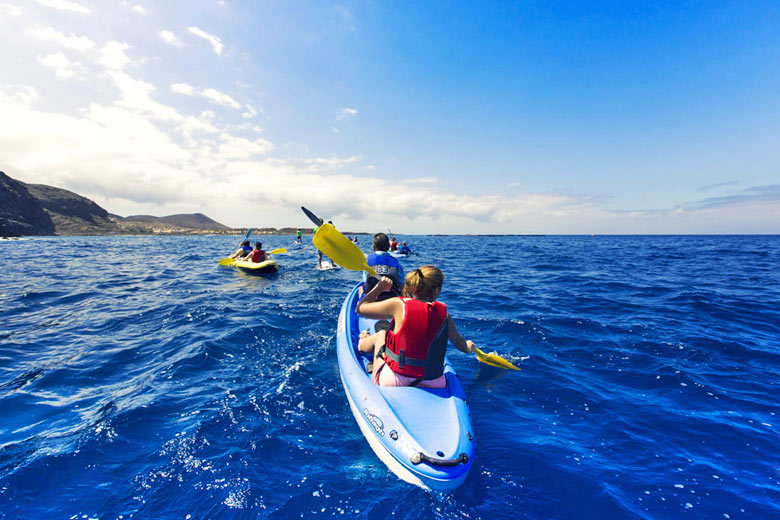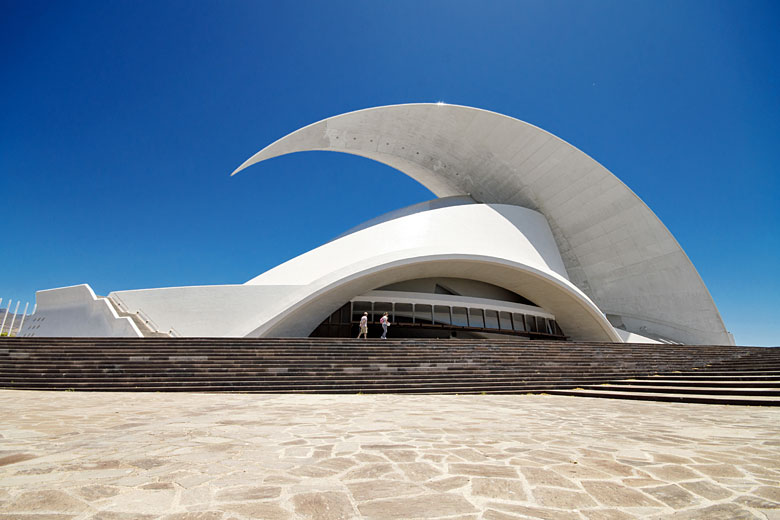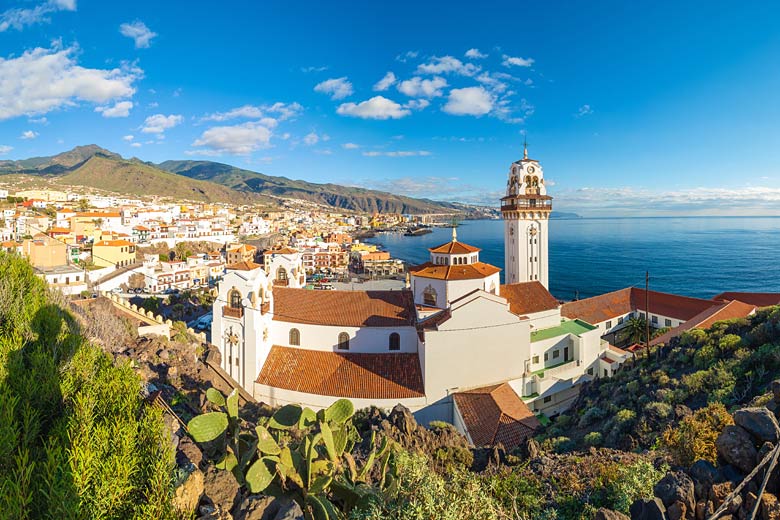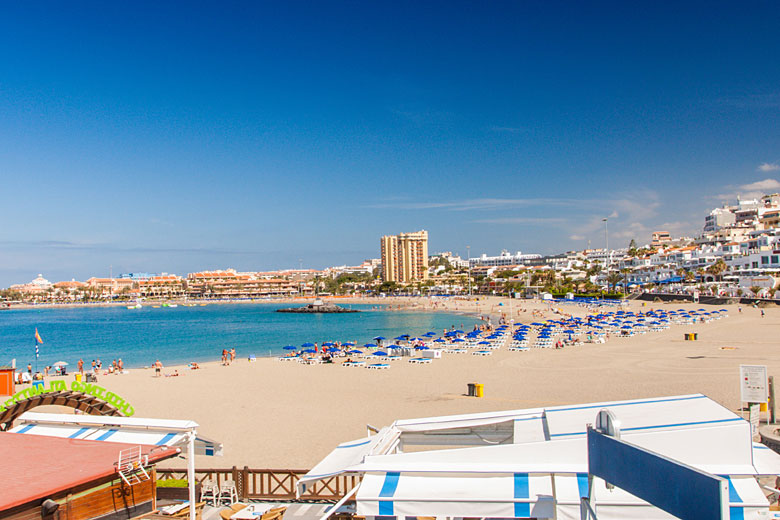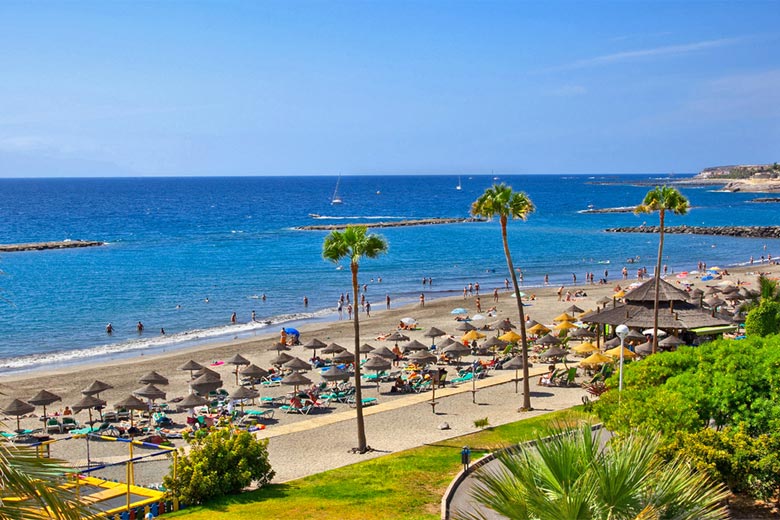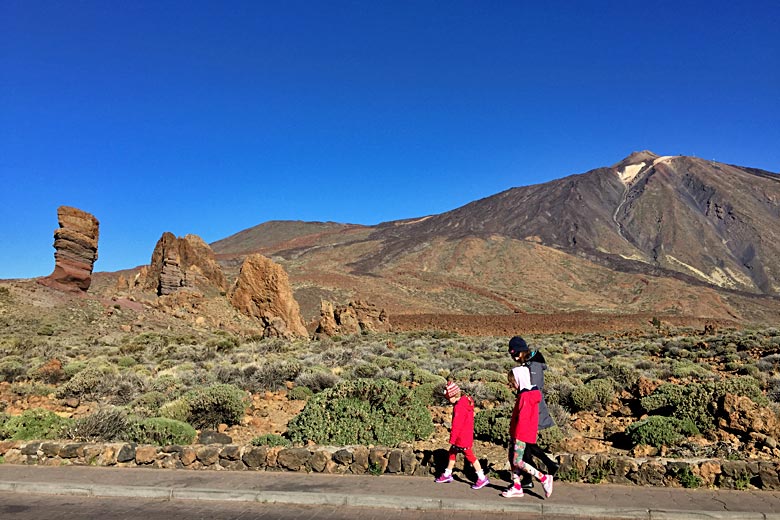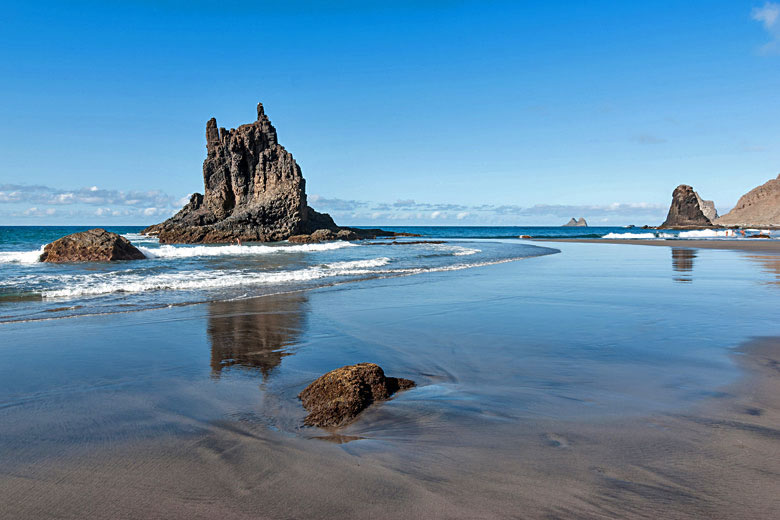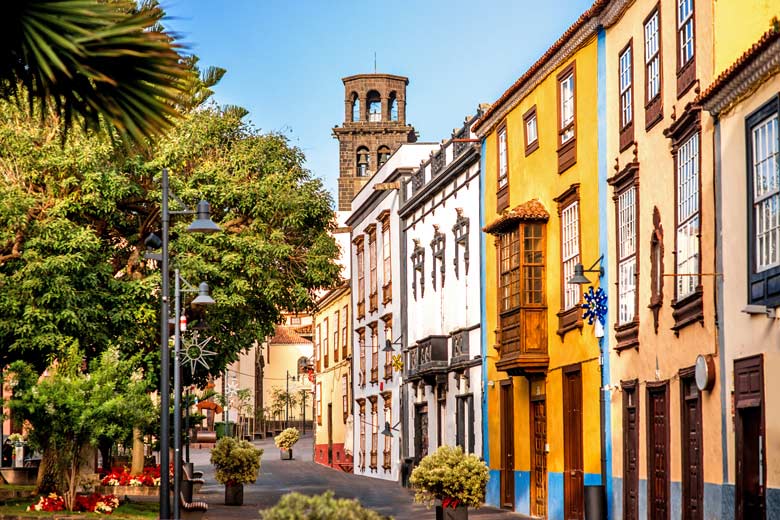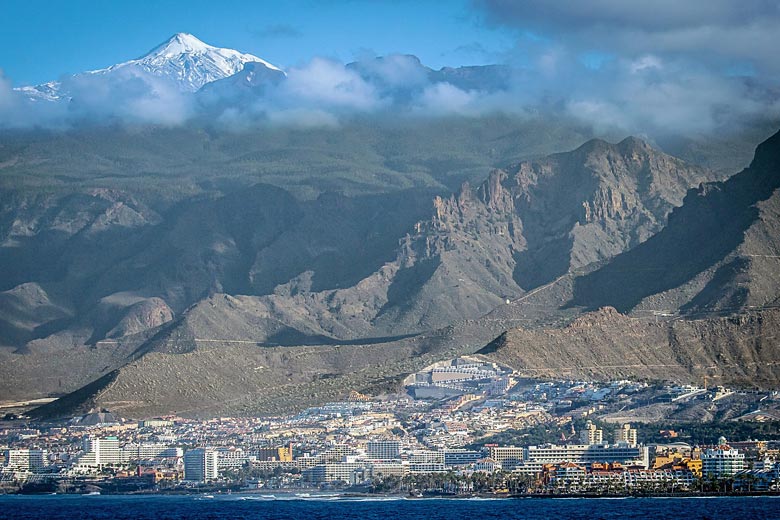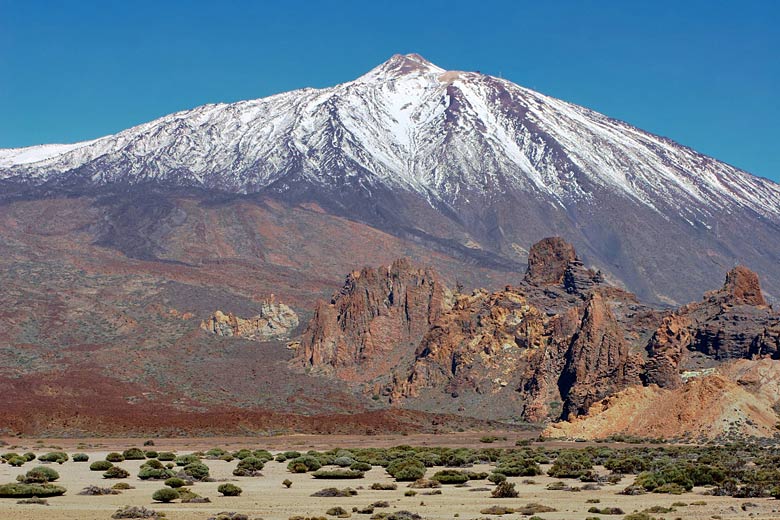- Book online with TUI & save up to 7% on holidays
- FREE child places available for select holidays
- Pay £0 deposits with direct debit & spread the cost
Best time to visit Tenerife
Tenerife's weather has drawn holidaymakers to its black and golden sand shores for decades.
- Best time to visit
- Weather by month
- 5-day weather forecast
- Destinations
- Travel advice
- Deals & discounts
Tenerife by month
Jan Feb Mar Apr May Jun Jul Aug Sep Oct Nov Dec
Recommended for Tenerife
The promise of warm sunshine with little chance of any rain makes it an attractive option, and when you consider the vast selection of things to do, from the beaches and water sports to hiking and exploring Teide National Park, it's easy to see why Tenerife is such a hit in both summer and winter.
Top Tenerife destinations
Below are the temperatures expected today at popular countries, regions and places in Tenerife. Select a destination to compare today's forecast with average weather conditions.
- Los Gigantes
- Costa Adeje
- Costa Del Silencio
- Golf del Sur
- Los Cristianos
- Playa de las Americas
- Santa Cruz De Tenerife
- Puerto de la Cruz
All Tenerife destinations
- Adeje
- Arona
- Callao Salvaje
- Costa Adeje
- Costa del Silencio
- El Medano
- El Sauzal
- Garachico
- Golf del Sur
- Guia de Isora
- La Caleta
- Las Caletillas
- Los Cristianos
- Los Gigantes
- Orotava
- Playa de Fanabe
- Playa de la Arena
- Playa de las Americas
- Playa Paraiso
- Puerto de la Cruz
- Puerto de Santiago
- San Isidro
- San Miguel
- Santa Cruz de Tenerife
- Santa Ursula
- Vilaflor
When is the best time to visit Tenerife?
The best time to visit Tenerife (Playa de las Americas) is July based on the following average weather conditions.
Maximum daytime temperature = 22 - 30°C [remove]
Daily hours of sunshine = 10 hours or more [remove]
Change the criteria to reflect your weather preferences.
Max Day Temperature (°C)
- Jan
 18
18 - Feb
 18
18 - Mar
 20
20 - Apr
 20
20 - May
 21
21 - Jun
 23
23 - Jul
 25
25 - Aug
 26
26 - Sep
 25
25 - Oct
 24
24 - Nov
 21
21 - Dec
 19
19
Best time to visit
The weather guide for Tenerife (Playa de las Americas) shows long term weather averages processed from data supplied by CRU (University of East Anglia) & today's weather forecast provided by meteoblue. Find out more about our data sources.
Metric (°C / mm) | Imperial (°F / inches)
Tenerife weather 2023/2024: an overview
Tenerife is the largest of the Canary Islands, which sits in the Atlantic Ocean just over 300 kilometres off the coast of Morocco. As with the other islands in the group, Tenerife's weather is some of the best in the world with plenty of sunshine: summers are very dry and quite hot, while winters are slightly cooler, with some rain.

Tenerife's weather, however, is more complex than you might expect: from north to south, sea level to the peak of Mount Teide, conditions can vary greatly within the same day, let alone across the seasons.
Conditions that affect the weather in Tenerife in this part of the Atlantic are governed by gentle trade winds that blow year-round from the northeast, and by the temperature of the Atlantic Ocean surrounding the island.
The trade winds provide a high degree of protection against unsettled weather while the temperature of the water, which varies only by about 4°C all year, prevents the island from becoming too hot in summer or too cold in winter.
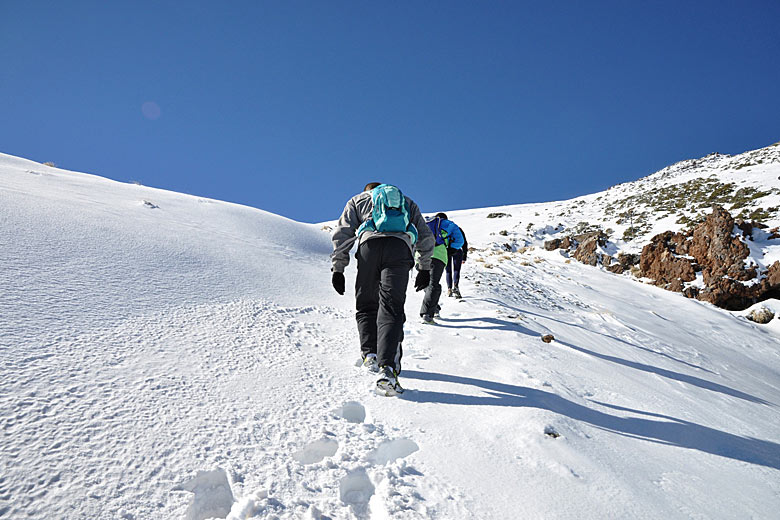
Locally, temperatures are also governed by altitude above sea level. The summit of Mount Teide in the centre of Tenerife is over 3,700 metres (12,000 ft), making it the highest point of any island in the Atlantic Ocean, and Spain's highest mountain, usually snowcapped in winter.
The air temperature at the summit can be as much as 20°C cooler than at sea level, while cloud and rainfall are also generally greater at higher elevations and, because of the prevailing northeasterly winds, more rain falls on north-facing slopes than in the south of the island.
- Tenerife's summer - May to October
- Tenerife's winter - November to April
Tenerife summer weather - May to October
While the weather in Tenerife may not see any drastic contrast between the seasons, the summer months do enjoy the highest temperatures, both on land and in the sea, as well as the most amount of sunshine.
Days are long, hot, and sunny with barely a drop of rain likely, making it a real winner for those after a holiday close enough to home to avoid a long haul flight but with reliable heat and sunshine to help make any break a big success.
Tenerife's weather sees temperatures climb from early summer highs of 21°C in May to 25°C by July, peaking at around 26°C in August, although it has been known to be far hotter during the height of summer, especially in the drier south of the island.
Heat and humidity isn't a huge issue here, with low levels in July, reaching a maximum of moderate in August only. Evenings gradually stay warmer as well, with lows of 14°C in May (you'll certainly need layers at this time), to the region of 19°C after dusk by August.
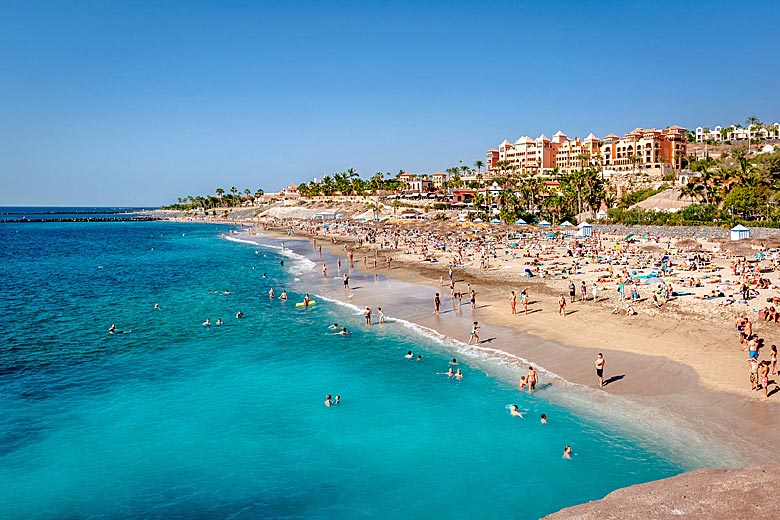
The sea too warms up steadily in summer, increasing by roughly a degree per month from 20°C in May to 23°C in August. There's loads of sunshine to be had with nine hours per day in May, June, and August, while July takes the top spot with no fewer than 10 hours of glorious sunshine per day.
The weather in Tenerife in late summer, September and October, is delightful, as the whole island has benefitted from the warmth of the sun over the previous months.
The sea stays warm until the end of October when temperatures start to decline, days remain hot at around 24°C or 25°C with low heat and humidity, and evenings are pleasant, dropping to 17°C or 18°C.
There's also plenty of sunshine about with as much as seven hours in October, unlike the UK, which sees only three hours at the same time, although do watch out for the UV, which remains very high in September.
Rainfall is rare and likely to be sharp and isolated if you see any at all. This welcoming weather in Tenerife is what helps make it so popular with those after late summer breaks and even half term holidays.
For those wanting to swim, the weather in Tenerife throws up various options at different times of the year. For shallow, sheltered water, head to the southwest coast where you'll find plenty of beaches with breakwaters where the sea is at its calmest in summer.
The north of the island is more exposed to the Atlantic with bigger waves, especially in winter, which is when surfers flock to the rougher seas. As for the wind, summer tends to see the strongest breezes, typically coming from the east/northeast.
Tenerife winter weather - November to April
The word 'winter' could be misleading: forget icy starts and dark days - Tenerife's weather in winter is a whole other ball game. Between November and December, the weather in Tenerife is cooling down from summer.
Days sit at 21°C in November, 19°C by December, there's no heat and humidity, and evenings turn chilly at 15°C and 13°C respectively.
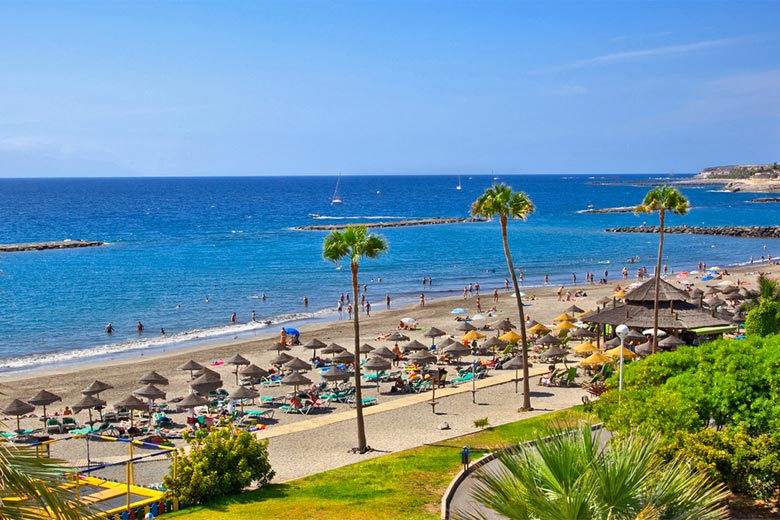
The sea retains its heat, and is still just warm enough to swim in at 22°C in November, and 20°C by December. There's a good six hours of sunshine to be had at this time, and only a slight increase in the risk of seeing any rain with December, statistically the wettest month of the year, seeing no more than six days affected in some way by rainfall.
These changes are small and subtle, marking the turn of the season but in no way an end to Tenerife's holiday weather conditions. Compared to the UK at this time, which sees a whopping one hour of sunshine in December and a high, if you're lucky, of 8°C, the weather in Tenerife in the early part of winter remains warm with lots of sunshine around.
Moving into the new year, the weather in Tenerife is pretty consistent from January to April, with only marginal shifts in conditions. January and February mark the coolest periods, with days typically reaching 18°C, edging towards 20°C by March and April.
Evenings are fresh at 12°C to 13°C, so do pack extra layers. The sea sits at about 19°C until May, which many find too chilly, so do book a hotel with a heated pool if you want to guarantee comfortable swimming.
The sun gradually offers more of itself as the year moves on, with six hours per day in January increasing to seven in February and March, and eight by April. Just watch out for the UV, which is also on the up from high in February to very high by March and April. A big bonus is the lack of heat and humidity, which makes no appearance at all from January to April.
As with the other Canary Islands, Tenerife's weather is susceptible to calima winds, which whip up dust and sand from the Sahara, blowing it into the Atlantic and over the islands.
Tenerife can become submerged in a cloud of thick dust with lower visibility, poorer air quality and higher temperatures that can last anywhere from a few hours to a few days. In theory, this can happen at any time of year, but February and March are prone to these storms.
Tenerife weather - summary
Tenerife's reputation as a fabulous holiday destination is well deserved. Put simply, it's never too hot or too cold, and it is mostly sunny as well as easy to get to.
While the island welcomes more than a quarter of a million UK holidaymakers every month, Tenerife's peak season is in winter when thousands of sun-starved Brits, plus other nationalities, head to the island to bask in the reliably warm rays and get a good dose of vitamin D.
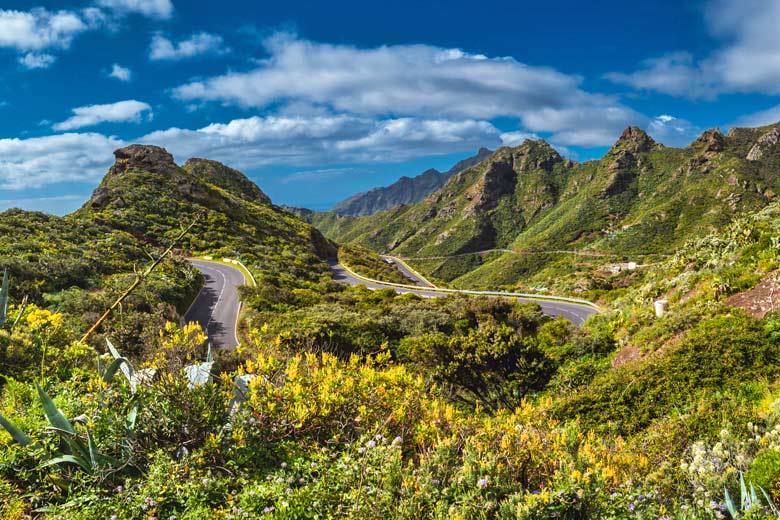
There's a simple way of looking at the difference in Tenerife's weather across the island throughout the year: for hot, dry conditions, ideal for going to the beach, stick to the bustling resorts of the south.
For rich green landscapes, dense pine and laurel forests, and hiking trails, make for the north; just be aware that typically, it is slightly cooler and cloudier with more chance of seeing some rain.
Interested in finding out more about Tenerife weather in 2023/2024? Don't miss our annual climate guide to Tenerife, which clearly shows averages throughout the year. Then there's the five-day weather forecast for the island and the weather today.
You can also find out more about visiting the island, and browse the latest cheap deals to Tenerife in our dedicated island guide.
Which is the hottest month in Tenerife?
The hottest time of year in Playa de las Americas, Tenerife is normally August. Expect maximum daytime temperatures to reach 26°C with moderate heat and humidity.
Which month has the most rain in Tenerife?
In terms of rainfall, December is usually the wettest month in Playa de las Americas, Tenerife with 75mm on average. There are normally 6 days in December with some rain.
When is it sunniest in Tenerife?
The sunniest time of year in Playa de las Americas, Tenerife is normally July with bright sunshine on average for 71% of daylight hours; that's 10 hours of sunshine per day.
When is the sea warmest in Tenerife?
The sea is usually at its warmest in Playa de las Americas, Tenerife in September when the water temperature reaches 24°C.
Tenerife travel features
Do you want to learn more about Tenerife? Read our latest features covering travel tips and insider destination guides on where to go and what to do in Tenerife.
Be inspired
Get your weekly fix of holiday inspiration from some of the world's best travel writers plus save on your next trip with the latest exclusive offers
We promise not to share your details
Related posts
Popular travel offers
Explore holidays in the sun for less
- Beach holidays
- Family holidays
- City breaks
- Summer holidays
- Winter sun holidays
- Holiday offers
- Top travel brands
- Airlines & flights
- Discount hotels
- Airport parking deals
- TUI
- Jet2holidays
- easyJet holidays
- Love Holidays
- British Airways
Airport parking
- Manchester Airport
- Stansted Airport
- Bristol Airport
- Luton Airport
- Birmingham Airport
- Edinburgh Airport
- Gatwick Airport
- Glasgow Airport
- Newcastle Airport
Airport lounges
- Manchester Airport
- Birmingham Airport
- Bristol Airport
- Edinburgh Airport
- Glasgow Airport
- Heathrow Airport
- Newcastle Airport
- Stansted Airport
- Gatwick Airport










 TUI deal finder
TUI deal finder












